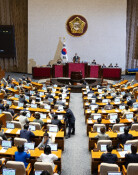Issuance of New Shares Likely to be Approved for Management Control Protection
Issuance of New Shares Likely to be Approved for Management Control Protection
Posted December. 16, 2004 22:45,
The government is pushing for ways to restrict the exercising of shareholder rights, including the right to convene a special shareholder`s meeting of investors who purchase stocks on a large scale for a limited period of time in a bid to protect management control of domestic companies from foreign investors.
In addition, the government is planning to allow additional stock issuance by domestic companies to empower them in preserving their management control when foreign capital is venturing tender offers on the company in question.
These measures are likely to enable domestic companies such as Samsung Electronics to defend management control from foreign investors more easily.
However, concerns over adverse side effects exist such as the withdrawal of foreign investment in the event of anti-market and discriminatory law enforcement against foreign investors.
A high-ranking official in the Ministry of Finance and Economy said on December 16, Among some management control protection-related reform bills submitted by lawmakers of the Finance and Economy Committee under the National Assembly, a few measures including permit of share issuance during the period of tender offer will be aggressively pursued at the government level.
Currently, three stock transaction reform bills presented by Song Young-kil from the Uri Party, Kim Ae-shil from the Grand National Party, and Kim Hyo-seok from the Millennium Democratic Party, respectively, are pending at the Finance and Economy Committee.
The bill to allow issuance of shares during the tender offer period enables recapitalization of the interested company when a tender offer is made by foreign investors to take over control of the company.
If this bill is successfully enforced, a foreign business that has been seeking management control of a domestic company will need more capital to secure the 25 percent-shareholding required to take over control. Also, the domestic company under attack can hand over newly issued shares to their friends.
The Ministry of Finance and Economy is also devising ways to limit shareholder rights, including the right to convene special shareholders meetings of the investor who has bought stocks in large quantities for a certain period of time if the investor changes the purpose of shareholding from regular investment to acquisition of management control.
If these policies go through, domestic companies in danger of losing their management control can stall to preserve their control. Nonetheless, the Finance and Economy Ministry is not considering such protectionist institutions as a graded voting rights system, in which more voting rights are given to large shareholders than to common stock counterparts, mandatory tender offer system, where investors that possess more than 30 percent of share are obligated to buy the rest of the stocks, and the measure to permit the exercising of voting rights of their own shares.
When foreign investors have made tender offers to take over a certain companys management control by submitting related statements to the supervisory authorities, the interested company is allowed the issuance of new stocks at below market price. This puts the existing large shareholders and their friendly forces in an advantageous position to defend their management control by increasing their shareholding.
Chi-Young Shin Chang-Won Kim higgledy@donga.com changkim@donga.com







